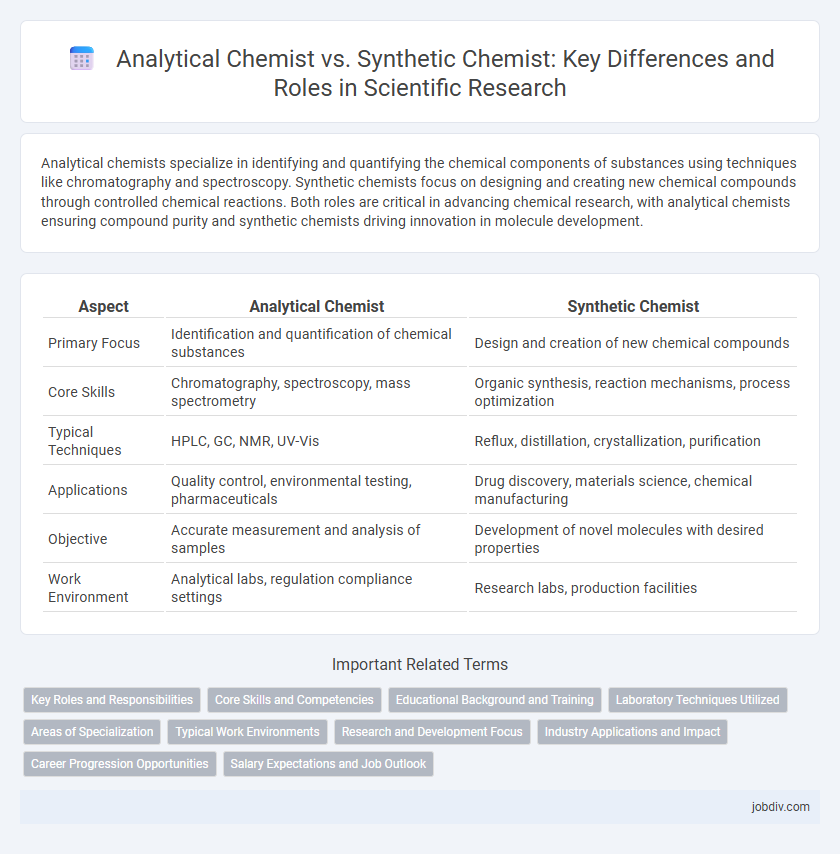Analytical chemists specialize in identifying and quantifying the chemical components of substances using techniques like chromatography and spectroscopy. Synthetic chemists focus on designing and creating new chemical compounds through controlled chemical reactions. Both roles are critical in advancing chemical research, with analytical chemists ensuring compound purity and synthetic chemists driving innovation in molecule development.
Table of Comparison
| Aspect | Analytical Chemist | Synthetic Chemist |
|---|---|---|
| Primary Focus | Identification and quantification of chemical substances | Design and creation of new chemical compounds |
| Core Skills | Chromatography, spectroscopy, mass spectrometry | Organic synthesis, reaction mechanisms, process optimization |
| Typical Techniques | HPLC, GC, NMR, UV-Vis | Reflux, distillation, crystallization, purification |
| Applications | Quality control, environmental testing, pharmaceuticals | Drug discovery, materials science, chemical manufacturing |
| Objective | Accurate measurement and analysis of samples | Development of novel molecules with desired properties |
| Work Environment | Analytical labs, regulation compliance settings | Research labs, production facilities |
Key Roles and Responsibilities
Analytical chemists specialize in identifying and quantifying chemical substances through techniques such as chromatography, spectroscopy, and mass spectrometry, ensuring quality control and compliance with regulatory standards. Synthetic chemists focus on designing and constructing new molecules via chemical reactions, aiming to develop pharmaceuticals, materials, and complex organic compounds. Both roles require rigorous data interpretation and collaboration with multidisciplinary teams to advance research and industrial applications.
Core Skills and Competencies
Analytical chemists excel in techniques such as chromatography, spectroscopy, and mass spectrometry to identify and quantify chemical substances with precision. Synthetic chemists demonstrate expertise in organic synthesis, reaction mechanisms, and process optimization to design and create novel compounds. Both roles demand strong problem-solving abilities, attention to detail, and a deep understanding of chemical principles, but analytical chemists prioritize measurement accuracy while synthetic chemists focus on molecular construction.
Educational Background and Training
Analytical chemists typically pursue degrees in chemistry with a strong emphasis on instrumental analysis, spectroscopy, and chromatography techniques, often supplemented by hands-on laboratory training in quantitative and qualitative analysis. Synthetic chemists usually focus their education on organic or inorganic chemistry, gaining extensive experience in reaction mechanisms, synthesis design, and laboratory-scale chemical synthesis through coursework and research projects. Both roles require practical training, but analytical chemists prioritize precision in measurement and data validation, while synthetic chemists emphasize method development and compound creation.
Laboratory Techniques Utilized
Analytical chemists primarily utilize techniques such as chromatography, spectroscopy, and mass spectrometry to identify and quantify chemical substances with precision. Synthetic chemists employ methods like organic synthesis, reaction optimization, and purification processes including recrystallization and distillation to create new compounds. Both disciplines rely on advanced instrumentation, but analytical chemists focus on measurement accuracy while synthetic chemists emphasize compound construction.
Areas of Specialization
Analytical chemists specialize in techniques such as chromatography, spectroscopy, and mass spectrometry to identify and quantify chemical substances with high precision. Synthetic chemists focus on designing and constructing new molecules through organic or inorganic synthesis, often aiming to create pharmaceuticals, polymers, or advanced materials. Both fields require a deep understanding of chemical principles, but analytical chemists prioritize measurement and identification, while synthetic chemists emphasize molecular creation and modification.
Typical Work Environments
Analytical chemists primarily work in laboratories within pharmaceutical companies, environmental agencies, and food safety organizations to conduct qualitative and quantitative analyses of chemical substances. Synthetic chemists frequently operate in research and development labs, chemical manufacturing plants, or academic institutions, where they design and synthesize new molecules or compounds. Both roles often collaborate in industrial settings but emphasize different phases of chemical investigation--analytical chemists focus on substance characterization, while synthetic chemists drive innovation through molecule creation.
Research and Development Focus
Analytical chemists specialize in the qualitative and quantitative analysis of chemical compounds using techniques such as chromatography, spectroscopy, and mass spectrometry to ensure accuracy and purity in research and development. Synthetic chemists focus on the design and creation of new molecules and compounds through chemical synthesis, aiming to develop novel materials, pharmaceuticals, or chemical entities. Both roles drive innovation in R&D, with analytical chemists validating and characterizing substances while synthetic chemists generate the foundational compounds for experimentation.
Industry Applications and Impact
Analytical chemists play a critical role in quality control, drug formulation, and environmental monitoring by precisely identifying chemical compositions and detecting contaminants in industrial products. Synthetic chemists drive innovation in pharmaceuticals, materials science, and agrochemicals through the design and creation of new molecules, enabling the development of novel drugs and advanced materials. Both disciplines complement each other; analytical chemistry ensures the reliability and safety of synthesized compounds, while synthetic chemistry expands the chemical space for industrial applications.
Career Progression Opportunities
Analytical chemists often advance by specializing in instrumental analysis techniques, quality control management, or regulatory compliance within pharmaceuticals and environmental sectors. Synthetic chemists typically progress through roles in research and development, leading to positions in process chemistry or drug discovery, where innovation in molecular synthesis drives career growth. Both fields offer leadership opportunities in project management, but analytical chemists may branch into validation and method development, whereas synthetic chemists pursue advanced synthesis strategy and scale-up expertise.
Salary Expectations and Job Outlook
Analytical chemists typically earn a median salary of $70,000 to $85,000 annually, reflecting strong demand in pharmaceuticals, environmental testing, and food safety sectors. Synthetic chemists often command higher salaries ranging from $75,000 to $95,000 due to their critical role in drug development, materials science, and chemical manufacturing. Job outlook projections from the Bureau of Labor Statistics indicate a steady growth rate of about 5% for both fields, driven by ongoing innovation and regulatory requirements.
Analytical Chemist vs Synthetic Chemist Infographic

 jobdiv.com
jobdiv.com